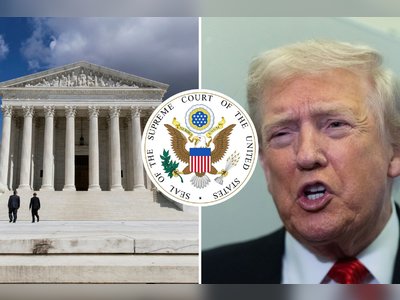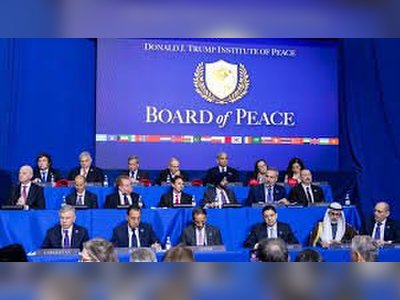
Why the Saudi Arabia weapons deal was a strategic necessity
We must provide our allies and partners who share our strategic objectives with the necessary arms they need to defend themselves.
Libertarians on the right and progressives on the left cooperated to try to defeat an effort to replenish the Kingdom of Saudi Arabia (KSA) of critical defenses. But Congress remained unconvinced of their objections and rightly approved of the weapons sale. The argument often focused on the technical abilities of the weapons themselves, but objections based on technicalities were easily refuted, and they distracted from a larger ongoing debate that is worth untangling.
The Biden administration’s foreign military sale package to KSA included $650 million in air-to-air munitions. These systems are purely defensive and every time one of those Advanced Medium-Range-Air-to-Air-Missiles (AMRAMM) or Guidance Enhanced Missiles (GEM-Ts) is fired, it knocks down a drone that could take out a hospital or orphanage. And these defenses are not new; the Saudis need them because they depleted their munitions in the ongoing war with Iranian proxies in Yemen. The Saudis will absolutely defend their people, so if they do not buy defenses from us, they will buy them from countries that are eager for their business.
So why the bipartisan pushback led by Rep. Ilhan Omar (D-Minn.) and Sen. Rand Paul (R-Ky.)? Their main reasons for opposing were that the AIM-120 air-to-air missiles and hundreds of missile launchers are not exclusively defensive and can reasonably be used to support offensive operations, and selling the arms would perpetuate the bloody war that has brutalized the population and included direct attacks on civilians.
They are right about the tragedy of the Yemen war. What they are wrong about is the cause of it, the way to end it and the role the U.S. military support plays.
The United States is focused on China as the pacing threat, and we are rightly seeking to reorient our defense planning and operations to deter Chinese aggression in the Pacific. But that does not mean we can afford to wash our hands of the European or Middle East theaters. The United States is still inextricably tied to the global energy market, our Asian allies remain reliant on Gulf petroleum and the energy market is a critical factor in geopolitics. Iran is the greatest cause of the violence and turmoil in the Middle East and has brandished its ability to affect the availability and price of energy by threatening to close the Strait of Hormuz.
Saudi Arabia leads the Gulf coalition in maritime security to keep critical shipping lanes open. And should the United States and allies like Saudi Arabia lose control of the security of those shipping lanes, countries like Iran and its increasingly bold partners — large nuclear powers China and Russia — would be greatly empowered to blackmail and coerce the United States and our allies more effectively.
Iran is funding and arming the Houthis in Yemen. And if Iran succeeds in helping the Houthis take control of Yemen, it would gain control of the contested area along Bab el-Mandeb, one of the world's crucial oil chokepoints. According to the U.S. Energy Information Administration's (EIA) fact-sheet on global oil chokepoints, 3.8 million barrels of oil and "refined petroleum products" passed through the Bab el-Mandeb each day on its way to Europe, Asia, and the United States.
The KSA and the United Arab Emirates are partnering to thwart Iranian-backed Houthis in Yemen. The partnership between Gulf states and the United States is critical to counter Iran. During the previous administration, the United States backed the coalition by selling offensive and defensive arms and providing military advice. But when President Biden entered office he ended U.S. support for offensive operations, including the sale of precision-guided munitions to KSA and UAE. Now, we only provide defensive systems.
The Iranian-backed Houthis have been attacking Saudi targets with drones. And the Houthis deliberately attack civilian targets like airports. The 280 AIM-120 (Advanced Medium-Range Air-to-Air Missiles) are desperately needed to defend against those dangerous drones. And the sale of those defensive systems comes with contractor support. The United States maintains a close military partnership with the Saudi-led coalition. It does not simply send them arms and look the other way. Concern for the way the Saudis conduct operations in Yemen, and the insistence that they do it in a way that minimizes civilian loss of life has been a bipartisan imperative that has spanned the Trump and Biden administrations. The U.S. would have much greater insight and influence on Saudi operations if we are the ones providing the weapons, oversight, and contractor support.
The Saudis and Emirates will not stop defending their interests from an aggressive Iranian regime. And the Saudis will not simply let Houthis attack civilians. The Biden administration’s tough KSA approach has already been causing them to look toward Russia and China. Saudi Arabia can procure additional air defense systems from Russia if they cannot buy them from the United States.
Further entanglement in the Middle East is something Americans rightly wish to avoid, and with a revanchist China, it is critical that we do avoid it. But the best way to avoid it is not simply abandoning the entire region. We must provide our allies and partners who share our strategic objectives with the necessary arms they need to defend themselves. Progressives and libertarians would do well to learn these lessons.
The Biden administration’s foreign military sale package to KSA included $650 million in air-to-air munitions. These systems are purely defensive and every time one of those Advanced Medium-Range-Air-to-Air-Missiles (AMRAMM) or Guidance Enhanced Missiles (GEM-Ts) is fired, it knocks down a drone that could take out a hospital or orphanage. And these defenses are not new; the Saudis need them because they depleted their munitions in the ongoing war with Iranian proxies in Yemen. The Saudis will absolutely defend their people, so if they do not buy defenses from us, they will buy them from countries that are eager for their business.
So why the bipartisan pushback led by Rep. Ilhan Omar (D-Minn.) and Sen. Rand Paul (R-Ky.)? Their main reasons for opposing were that the AIM-120 air-to-air missiles and hundreds of missile launchers are not exclusively defensive and can reasonably be used to support offensive operations, and selling the arms would perpetuate the bloody war that has brutalized the population and included direct attacks on civilians.
They are right about the tragedy of the Yemen war. What they are wrong about is the cause of it, the way to end it and the role the U.S. military support plays.
The United States is focused on China as the pacing threat, and we are rightly seeking to reorient our defense planning and operations to deter Chinese aggression in the Pacific. But that does not mean we can afford to wash our hands of the European or Middle East theaters. The United States is still inextricably tied to the global energy market, our Asian allies remain reliant on Gulf petroleum and the energy market is a critical factor in geopolitics. Iran is the greatest cause of the violence and turmoil in the Middle East and has brandished its ability to affect the availability and price of energy by threatening to close the Strait of Hormuz.
Saudi Arabia leads the Gulf coalition in maritime security to keep critical shipping lanes open. And should the United States and allies like Saudi Arabia lose control of the security of those shipping lanes, countries like Iran and its increasingly bold partners — large nuclear powers China and Russia — would be greatly empowered to blackmail and coerce the United States and our allies more effectively.
Iran is funding and arming the Houthis in Yemen. And if Iran succeeds in helping the Houthis take control of Yemen, it would gain control of the contested area along Bab el-Mandeb, one of the world's crucial oil chokepoints. According to the U.S. Energy Information Administration's (EIA) fact-sheet on global oil chokepoints, 3.8 million barrels of oil and "refined petroleum products" passed through the Bab el-Mandeb each day on its way to Europe, Asia, and the United States.
The KSA and the United Arab Emirates are partnering to thwart Iranian-backed Houthis in Yemen. The partnership between Gulf states and the United States is critical to counter Iran. During the previous administration, the United States backed the coalition by selling offensive and defensive arms and providing military advice. But when President Biden entered office he ended U.S. support for offensive operations, including the sale of precision-guided munitions to KSA and UAE. Now, we only provide defensive systems.
The Iranian-backed Houthis have been attacking Saudi targets with drones. And the Houthis deliberately attack civilian targets like airports. The 280 AIM-120 (Advanced Medium-Range Air-to-Air Missiles) are desperately needed to defend against those dangerous drones. And the sale of those defensive systems comes with contractor support. The United States maintains a close military partnership with the Saudi-led coalition. It does not simply send them arms and look the other way. Concern for the way the Saudis conduct operations in Yemen, and the insistence that they do it in a way that minimizes civilian loss of life has been a bipartisan imperative that has spanned the Trump and Biden administrations. The U.S. would have much greater insight and influence on Saudi operations if we are the ones providing the weapons, oversight, and contractor support.
The Saudis and Emirates will not stop defending their interests from an aggressive Iranian regime. And the Saudis will not simply let Houthis attack civilians. The Biden administration’s tough KSA approach has already been causing them to look toward Russia and China. Saudi Arabia can procure additional air defense systems from Russia if they cannot buy them from the United States.
Further entanglement in the Middle East is something Americans rightly wish to avoid, and with a revanchist China, it is critical that we do avoid it. But the best way to avoid it is not simply abandoning the entire region. We must provide our allies and partners who share our strategic objectives with the necessary arms they need to defend themselves. Progressives and libertarians would do well to learn these lessons.








